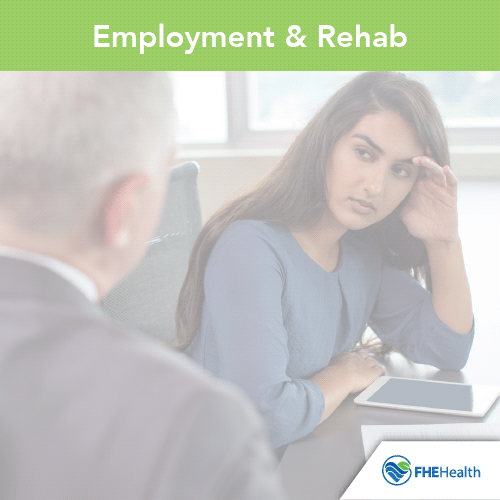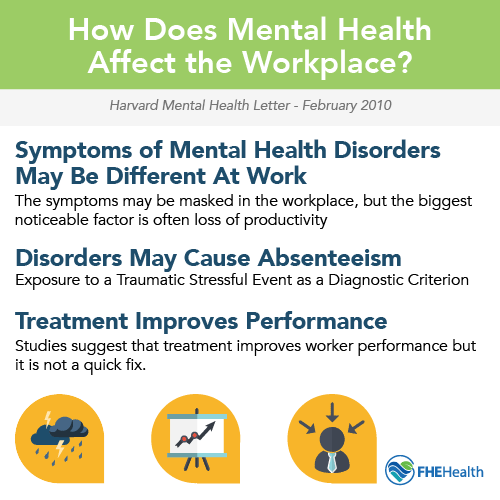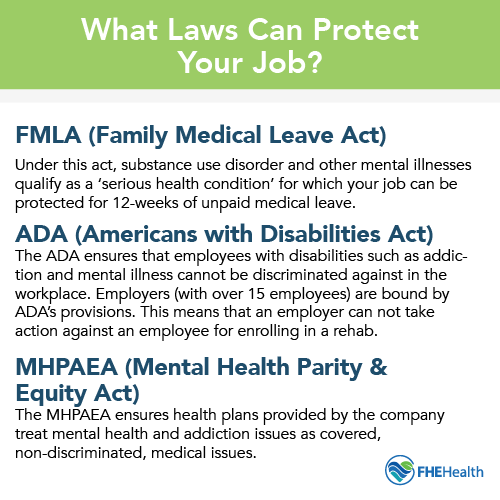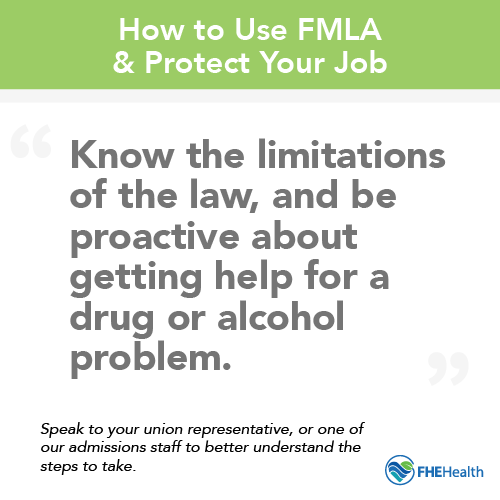Can I be fired or lose my job if I go to rehab? Will I have a job to come back to if I go to rehab? How do I tell my employer I need help? If you’re asking these questions, you’re not alone. We understand the concern about employment when looking for rehab and we hear it a lot. Worries about job security are very common among working Americans who need treatment for substance abuse and other mental health conditions. In the absence of an adequate answer to their concerns, many of them simply forego much-needed care. For example, of the 70 percent of adults with a drug or alcohol problem who reportedly are either employed full-time or part-time, less than 10 percent of them end up in rehab.
 But foregoing treatment isn’t the answer to protecting your job or your health. While having to hold down a job is a common excuse for not getting treatment for an addiction or mental health problem, the excuse is also, tragically, a mistaken one. That’s because there are legal protections in place that will protect your job while you get the treatment your health deserves. In this section, we will give you an overview of the laws and legal protections that secure your right to keep your job while going to rehab, including answers to common questions.
But foregoing treatment isn’t the answer to protecting your job or your health. While having to hold down a job is a common excuse for not getting treatment for an addiction or mental health problem, the excuse is also, tragically, a mistaken one. That’s because there are legal protections in place that will protect your job while you get the treatment your health deserves. In this section, we will give you an overview of the laws and legal protections that secure your right to keep your job while going to rehab, including answers to common questions.
If you need personalized answers to questions about how these laws may apply to your individual job situation, we strongly encourage you to call our counselors. They are available 24/7 to provide the answers you need to feel secure in your job as you put your health first.
No job—no matter how important—should stand between you and the treatment you need to get better. In some cases, a decision to step away from work in order to get treatment may in fact mean the difference between life and death. Call our counselors today to get the answers you need.
“Can My Employer Fire Me for Going to Rehab?”

Findings reported by Harvard have confirmed this truth, concluding that “low treatment rates imperil workers’ careers and companies’ productivity,” by causing absenteeism and compromising work performance. In this sense, going to rehab is the very best way to protect your job.
That said, knowing what anti-discrimination laws exist to protect you is a good precaution to take, so that if an employer threatens your job with a claim of absenteeism or negligence, you can refer to these laws to protect yourself….
Laws to Protect Your Job When You’re in Rehab

- Family Medical Leave of Absence Act (FMLA)– Under the terms of the FMLA law, a substance use disorder and/or other mental illness qualifies as a “serious health condition” for which some U.S. employees are entitled to 12 weeks of unpaid, job-protected medical leave. When our Director of Public Relations Janet B. Gerhard speaks to employees and companies about FMLA guidelines, she uses what she calls “the rule of 12’s” to explain how FMLA for rehab works: an employee has to have worked for a public or private employer for at least 12 months to qualify for FMLA benefits; upon approval from their employer, they are allowed to take 12 unpaid weeks in a 12-month period, or will have worked at least 1,250 hours in that 12-month period. The FMLA requires that your employer continue to provide you with the same level of health insurance coverage during your absence. They must also ensure that you have the same pay, benefits and other terms and conditions of employment upon your return from rehab— although they also don’t have to give you back your exact same job.
- Americans with Disabilities Act (ADA) – Addiction and mental illness are disabilities that deserve certain anti-discrimination protections in a job setting, according to the ADA. Employers that employ 15 or more people are bound by the ADA’s provisions. These include job protections for those who are currently enrolled in a rehab program and reasonable accommodations for those who are successful in recovery from past drug or alcohol abuse. The ADA may not protect your job, however, if you are currently using illicit drugs or drinking while at work, or if your drug or alcohol problem is currently impacting your job performance.
- Mental Health Parity and Addictions Equity Act (MHPAEA) – Lest you’re wondering whether your employer’s health insurance plan will provide the same level of coverage for a mental health problem as it does for other medical conditions, the answer is, generally speaking, “yes,” thanks to the MHPAEA. This federal law prevents group health plans and health insurance companies from, in essence, penalizing addiction and mental health problems with less favorable benefits than other medical conditions.
The Importance of Correct Interpretation and Application of These Laws
It’s important that you utilize these laws properly— as in proactively before you can be legitimately cited for job negligence and/or drug or alcohol abuse in the workplace. For example, exercising FMLA benefits for drug addiction requires that you let your employer know in advance with a physician’s note. Taking this initiative to have a conversation with your employer—as opposed to waiting for them to initiate the conversation and in turn drug test you—also ensures that when you go to rehab you are protected under the provisions of the ADA. (Remember: current substance abuse and/or impaired job performance are legitimate grounds for dismissal.)
Gerhard noted that she often encounters misunderstandings about the FMLA that can get employees into trouble with employers. For instance, the law makes accommodations for intermittent use of FMLA substance abuse and other mental health benefits, but these accommodations require a doctor’s note and your employer’s approval of the circumstance. Misuse of the FMLA for other situations, such as a flat tire on the way to work, can be disciplined, and, depending on their gravity, could endanger your job. The takeaway: know the limitations of the law, and be proactive about getting help for a drug or alcohol problem.
Your Career After Treatment

If you made use of FMLA benefits, your employer will probably require that you complete a “Return to Work” agreement, which will entail a signed form from your physician stating that you are healthy enough to return to work and fulfill your job duties. If your time away has been for substance abuse, your employer may require regular drug screens and verification of treatment compliance.
When you go back to work, bear in mind that if your employer discriminates against you because of your condition, that is against the law. They have a legal duty to treat you like any other person with a medical condition— and are also bound by HIPAAA laws that protect your health privacy. What this means is that you have a right to return to work without having to divulge anything about your condition that you don’t want to; and, that people probably won’t ask you about the medical reasons for your leave of absence, anyway. Chances are that your coworkers will just be glad to have you back in the saddle, healthier, happier and ready to get back to work.
Do you have more questions related to FMLA and other legal provisions? Call our counselors today. They can give you personalized advice. Don’t let an addiction or mental health problem cost you both your job and your health. Get immediate help before it’s too late.








